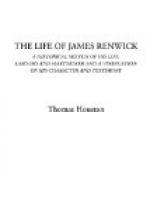Finally—the testimony of Renwick is valuable, as throwing light on great evils connected with systems of civil government, and with Protestant churches, and as pointing out clearly the duty of faithful witnesses in relation to them. Two great principles—the one doctrinal, and the other practical, were essential to it, or rather constituted its whole speciality. These were—first—that, according to the national vows, and the reformation attainments, the whole civil polity of the nation should be conformed to the Scriptures,—and secondly, the positive duty of distinct separation from whatever systems in the state or the church that are opposed to entire allegiance to Messiah, the Prince. The civil constitution and the national legislation and administration, as well as the lives of rulers, were required to be in subjection to His authority, and in accordance with the prescriptions of His word. When such subjection is withheld, Christ’s servants, if they would be faithful to the exalted Saviour, cannot do otherwise than refuse to incorporate with the national society, and to homologate the acts of its rulers; and from Churches that do not testify against national defection, they are constrained to maintain distinct separation. The past history of the Church bears clear testimony that truth has been frequently preserved, when it was in danger of being lost, by open separation from those who were bent on declension and apostacy.
In our day, it should not be regarded as enough to profess in theory the doctrine of Christ’s Headship, or merely to speak in commendation of a martyr-testimony. We should aim, as Renwick and his followers, at whatever inconvenience and hardship, to give it practical effect. The reason why these honoured confessors disowned the authority of Charles and his brother, was, not solely or chiefly, because of their tyranny or persecuting measures, but principally because the authority assumed was opposed to the exclusive royal prerogatives of the Redeemer. The public evils against which Renwick and the later martyrs testified to the death, did not cease at the Revolution; nor can we admit that the Revolution Settlement embodied all the principles for which the Covenanted martyrs contended, and suffered, and died. On the contrary, there are essential and inherent evils in the Revolution Settlement, both civil and ecclesiastical, which exist to this day, and which render a decided testimony against it dutiful now, as it was at the period of the Revolution. The Act Rescissory, which was passed at the Restoration, is still retained in the Statute Book: the National Covenants were abandoned, both by the Church and the nation, and neither has returned to a sense of their obligation. The Scriptural attainments of the Reformation were left under a gravestone. Presbyterianism was established in Scotland—not because it was Scriptural or right in itself, but because it was agreeable to the wishes of the majority of the nation, and it was set up on an Erastian basis. By the introduction of the curates into the ministry of the Scottish establishment, at the king’s behest, without any public confession or renunciation of Prelacy—the germ of Moderatism was laid, which, in due time, budded and brought forth bitter fruits, in numerous corruptions and oppressions, and in multiplied divisions and separations.




